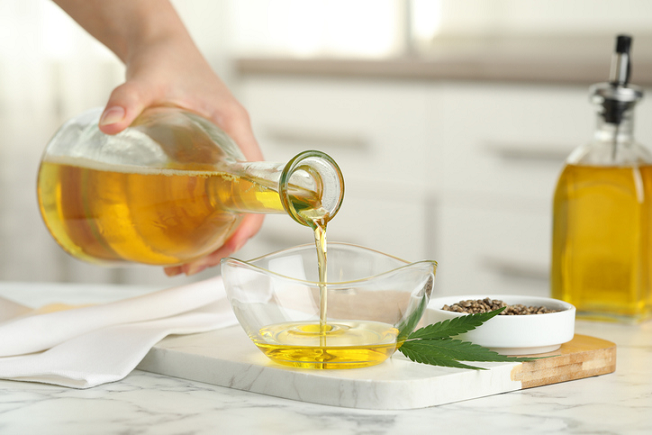Processed and ultra-processed foods have been the highlight of many recent news stories over the past several years, and for good reason. Rates of chronic disease, mental disorders, and obesity in the United States continue to increase while the crushing weight of the financial burden on society also increases. Doctors and researchers have found yet another reason to avoid ultra-processed foods: the heavy presence of industrially made seed oils have been linked to an increased risk of colon cancer, particularly in younger adults.1
Colorectal Cancer Uptick in Younger Generations
Seed oils are commonly used plant-based cooking oils such as vegetable oil, canola oil, grapeseed oil, and sunflower oil. They are widely used in packaged foods of all varieties— roasted nuts, salad dressings, candy bars, crackers, and much more.
Seed oils are not only highly processed, but they also contain fats that are oxidized during storage, heating, or the processing itself. Excess consumption of seed oils can cause inflammation in the body, which at the root of many diseases marked by chronic inflammation like diabetes, obesity, heart disease, irritable bowel syndrome, and other poor health conditions. The seed oils considered harmful to health include sunflower oil, corn oil, canola oil, cottonseed oil, soybean, oil, safflower oil, grapeseed oil, rice bran oil, and peanut oil.2
Doctors have noted a “clear uptick” in colorectal cancer, a cancer that used to largely affect those over 55, in younger generations.2 According to Yale Medicine, nearly double the number of young adults under age 55 are being diagnosed with and dying from colorectal cancer compared to a decade ago.3
Tumor Samples Demonstrate Increased Molecules that Hinder Healing, Promote Tumor Growth
To better understand the role of seed oils in colon cancer, researchers at the University of South Florida Health (USF) and Tampa General Hospital Cancer Institute analyzed 162 tumor samples from colon cancer patients. They found that the tumors examined demonstrated increased levels of small oily molecules, known as bioactive lipids, that are produced when the body metabolizes seed oils. In addition to increasing inflammation, these molecules hinder the body’s healing process and foster the growth of tumors.4
“It is well-known that patients with unhealthy diets have increased inflammation in their bodies,” study author and professor of surgery Timothy Yeatman, MD stated. “We now see this inflammation in the colon tumors themselves, and cancer is like a chronic wound that won’t heal. If your body is living off daily ultra-processed foods, its ability to heal that wound decreases due to the inflammation and suppression of the immune system that ultimately allows the cancer to grow.”5
According to Dr. Yeatman, the findings highlight the harms of the Western diet with culprits such as inflammatory seed oils, added sugars, and ultra-processed foods and chemicals.
He adds that the immune system is extremely powerful and drastically impacts the tumor microenvironment— but that the body will struggle to do so if that immune system is suppressed by inflammatory oils and processed foods. The study was funded by the U.S. National Institutes of Health (NIH)5
Scientists Continue to Promote Seed Oils
Many scientists, health professionals, and news outlets have insisted that consuming seed oils as part of a balanced diet has not been shown to cause cancer. For years, experts have insisted that there is an overwhelming body of research demonstrating that highly processed oils are a healthier option than saturated fats such as butter.
Like many dietary recommendations, the urge to avoid fats or substitute saturated fats with highly processed vegetable fats is ripe with food industry influence. There are several routes in which companies successfully convinced the American people that saturated fats were to blame for health problems, particularly heart disease, which was on the rise in the early to mid 1900s. One of these ways was the sugar industry paying scientists to downplay risks of sugar and highlight, or even falsify, the hazards of fat. The recommendations based off of these skewed findings are still followed.6
Proctor & Gamble Convinced American Public of Crisco’s Perceived Health Benefits
Prior to the early 1900s, most American homes used butter or lard for cooking needs. Around the year 1911, Proctor & Gamble developed the solid and readily available Crisco— a partially hydrogenated cottonseed oil. The company used aggressive marketing campaigns to convince the American public of its perceived health benefits in favor of nature made oils like butter, tallow, and lard. Relatives William Procter and James Gamble’s decision to use cotton seed oil came at the heels of the booming cotton industry which resulted in the buildup of unusable, toxic waste from cotton seeds. The relatives transformed the cotton seed oil into the solid fat many American homes came to know as Crisco.7
According to an article written by Zero Acre, the success of Proctor & Gamble and their Crisco crusades opened the floodgates for the widespread production of other cheap seed oils we so commonly see today, most of which went years without any regulation on their dietary health claims.
Popular Magazine wrote: “What was garbage in 1860 was fertilizer in 1870, cattle feed in 1880, and table food and many things else in 1890.”7
The American Heart Association continues to promote seed oils, stating that the high levels of omega-6 fatty acids, also known as linoleic acids, are not a bad thing. “While 0mega-6 is pro-inflammatory, the amount of inflammation it’s associated has not been shown to be harmful,” says Christopher Gardner, PhD, a Stanford nutrition science professor. “They are not to be feared.”8
Processed Foods, Seed Oils Consumed in Excess
Consumption of seed oils has risen drastically over the past century, but particularly in the past two decades. For many Americans, the consumption of ultra-processed foods comprises more than half of all calories, and that number is increasing.9
It is largely unavoidable to find processed foods without seed oils, which increases the likelihood of creating chronic inflammation and health problems for those relying on processed foods for the majority of their nutritional intake. While humans need omega-6 in their diets, a balance between omega-3s and omega-6s is important. Developing a deficiency of omega-6 fatty acids is nearly impossible, which highlights the need to refrain from consuming lineoleic acid containing seed oils in excess.
If you would like to receive an e-mail notice of the most recent articles published in The Vaccine Reaction each week, click here.
Click here to view References:1 Rudy M. Cooking oil linked to colon cancer in early study, tied to inflammation. Fox News Dec. 13, 2024.
2 REP Provisions. 7 reasons seed oils are bad for your health.
3 Katella K. Colorectal cancer: what millennials and Gen Zers need to know. Yale Medicine Jan. 17, 2024.
4 Masciadrelli M. Why are colorectal cancer rates rising among younger adults? Yale News Mar. 29, 2023.
5 Independent. Banatvala, S. Common cooking oil could be causing colon cancer urge in young people, warn doctors. Dec. 19, 2024.
6 Bailey M. Sugar industry secretly paid for favorable Harvard research. STAT News Sept. 12, 2016.
7 Patterson D. Vegetable oils: a history of fats gone wrong. Zero Acre Apr. 10, 2023.
8 O Williamson L. There’s no reason to avoid seed oils and plenty of reasons to eat them. American Heart Association News Aug. 20, 2024.
9 Johns Hopkins. Ultraprocessed foods account for more than half of calories consumed at home. Dec. 10, 2024.













8 Responses
You should do more research before writing this story. Butter and other animal fats are much worse than seed oils. You are ignoring the overwhelming evidence and subscribing to yet again the meat and dairy industry propaganda.
Bret you are obviously quite unaware of / uneducated in human biology. The body only requires @ 2-4 mg of O6 daily – NOT the hundreds it gets thru seed oils/ processed foods! They ARE poison.
You should do your research before critiquing this story incorrectly. What you claim about animal fats is untrue.
Bret, would you be willing/able to provide some of that overwhelming evidence? Seed oils became part of the (western) human diet only in the late 1800’s. What did people eat in the thousands of years before then? I have a hard time imagining God speaking with Adam overlooking the Garden of Eden, and God telling Adam that all that marvelous abundance was available to him, — except the fats! The fats had to come out of a factory, having undergone elaborate processes only doable in such a factory. I’m genuinely curious to give a look at what you have that supports your argument. Thanks!
Cardiovascular disease was almost unknown until the introduction of seed oils to the human diet. The first reported heart attack was in 1912, after the introduction of seed oils to the human diet. Before that about 99% of the fat most people consumed was derived from animals.
I know an American ER doctor, who worked in Thailand several decades ago. When he started working there, he asked his Thai ER colleagues, where the EKG and other cardiovascular equipment was. The answer was, they had none. They did not need it. They had no cardiovascular disease at all. The Thai did not cook with seed oil at that time, but with coconut oil and possibly some animal fat. Coconut oil is not a seed oil, but a hydrogenated, very stable fat.
I’m now using good old lard instead of seed oils. Wish I would have done this years ago.
I use sunflower oil for massages. sunflower oil is cheaper healthy and won’t stain. sunflower oil will oxidate and should be kept cool and used in 6 months.
but you don’t want to put cool oil on a hot body.
Stay away from baby oil!
Luckily, I stopped doing what the TV said to do, long ago. I embraced real butter, which is now known to preserve the senovial (sp) fluid in the joints. I’m 65 and my joints are great. I also do take Flax-seed oil (very high in Omega 3). Also – I was raised on whole, unpasteurized milk! RB. check out my film at 50centsmovie.com